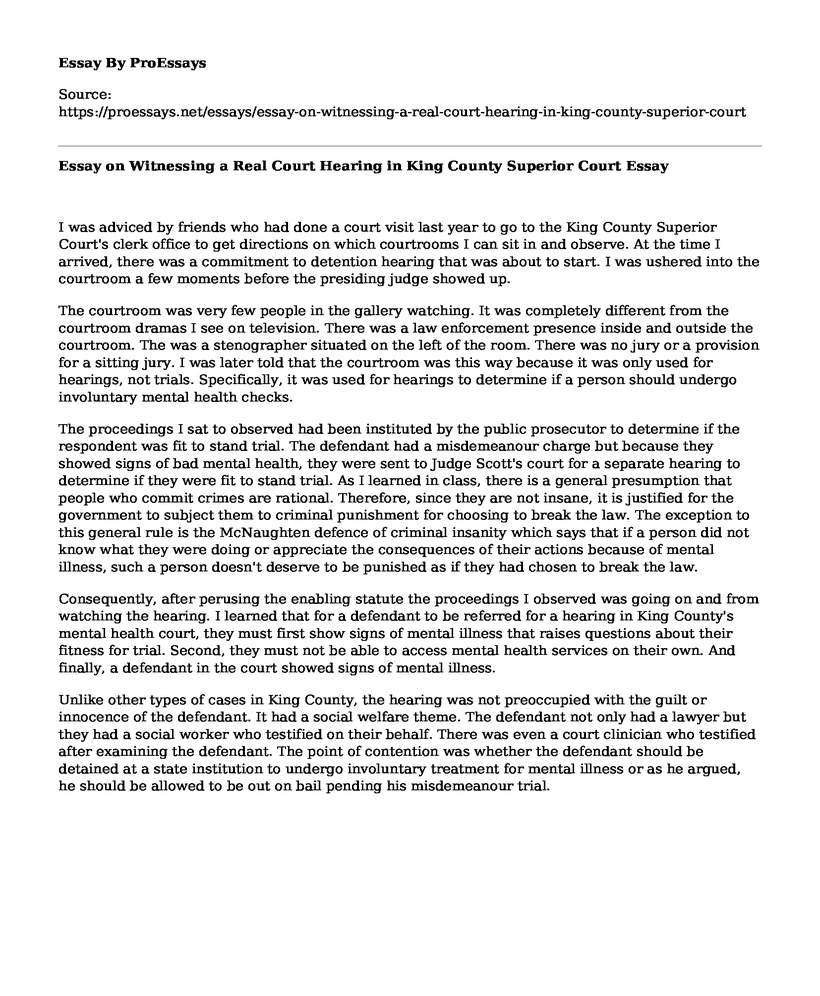I was adviced by friends who had done a court visit last year to go to the King County Superior Court's clerk office to get directions on which courtrooms I can sit in and observe. At the time I arrived, there was a commitment to detention hearing that was about to start. I was ushered into the courtroom a few moments before the presiding judge showed up.
The courtroom was very few people in the gallery watching. It was completely different from the courtroom dramas I see on television. There was a law enforcement presence inside and outside the courtroom. The was a stenographer situated on the left of the room. There was no jury or a provision for a sitting jury. I was later told that the courtroom was this way because it was only used for hearings, not trials. Specifically, it was used for hearings to determine if a person should undergo involuntary mental health checks.
The proceedings I sat to observed had been instituted by the public prosecutor to determine if the respondent was fit to stand trial. The defendant had a misdemeanour charge but because they showed signs of bad mental health, they were sent to Judge Scott's court for a separate hearing to determine if they were fit to stand trial. As I learned in class, there is a general presumption that people who commit crimes are rational. Therefore, since they are not insane, it is justified for the government to subject them to criminal punishment for choosing to break the law. The exception to this general rule is the McNaughten defence of criminal insanity which says that if a person did not know what they were doing or appreciate the consequences of their actions because of mental illness, such a person doesn't deserve to be punished as if they had chosen to break the law.
Consequently, after perusing the enabling statute the proceedings I observed was going on and from watching the hearing. I learned that for a defendant to be referred for a hearing in King County's mental health court, they must first show signs of mental illness that raises questions about their fitness for trial. Second, they must not be able to access mental health services on their own. And finally, a defendant in the court showed signs of mental illness.
Unlike other types of cases in King County, the hearing was not preoccupied with the guilt or innocence of the defendant. It had a social welfare theme. The defendant not only had a lawyer but they had a social worker who testified on their behalf. There was even a court clinician who testified after examining the defendant. The point of contention was whether the defendant should be detained at a state institution to undergo involuntary treatment for mental illness or as he argued, he should be allowed to be out on bail pending his misdemeanour trial.
Cite this page
Essay on Witnessing a Real Court Hearing in King County Superior Court. (2023, Jan 16). Retrieved from https://proessays.net/essays/essay-on-witnessing-a-real-court-hearing-in-king-county-superior-court
If you are the original author of this essay and no longer wish to have it published on the ProEssays website, please click below to request its removal:
- Research Paper Example: Correctional System of the U.S. and Germany
- Teachers Should Be Armed - Argumentative Essay
- Legal Nurse Consultant Profession Paper Example
- Civil and Alternate Dispute Resolution Process Essay
- Research Paper on Violent Crimes in the United States
- Alternatives to Imprisonment: Solutions to Overcrowding in Jails and Prisons - Essay Sample
- Justice System & Correctional Facilities: A Broken Promise? - Essay Sample







